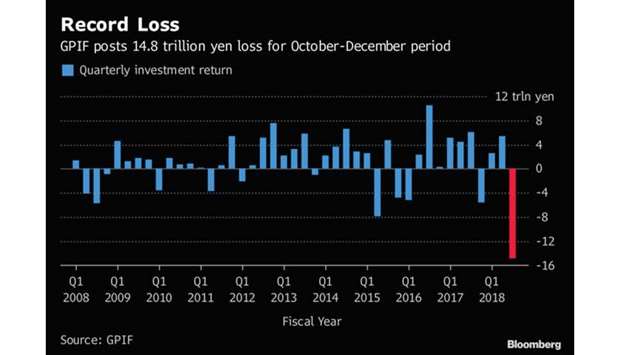The world’s biggest pension fund posted a record loss after a global equity rout last quarter pummeled an asset class that made up about half of its investments.
Japan’s Government Pension Investment Fund lost 9.1%, or ¥14.8tn ($136bn), in the three months ended December 31, it said in Tokyo on Friday. The decline in value and the rate of loss were the steepest based on comparable data back to April 2008. Domestic stocks were the fund’s worst performing investment, followed by foreign equities. Assets fell to ¥150.7tn at the end of December from a record ¥165.6tn in September.
While stocks helped the GPIF generate returns for the previous two fiscal years, December’s global rout underscored the risks facing the fund since it revamped strategy in 2014 to accumulate stocks and pare domestic bonds.
The GPIF may have little choice but to invest in equities as fixed-income yields, especially those of Japanese government debt, are too low, said Naoki Fujiwara, chief fund manager at Shinkin Asset Management Co in Tokyo.
“It makes sense for the GPIF to hold some risk assets in this environment because yields are low globally and bond investments don’t give good returns,” Fujiwara said. “Yet from a pensioner’s point of view, it takes too much risk on its investments.” More than $10tn in equity value was wiped out from the global markets last quarter as an ongoing trade spat between the US and China raised concern over a slowdown in growth.
The Topix index plunged 18% in the October-December period, the biggest quarterly decline since 2008, while the S&P 500 Index dropped 14%, the most since 2011. Japan’s currency strengthened 3.7% against the dollar in the quarter.
Shingo Ide, the chief equity strategist at NLI Research Institute in Tokyo, points out that the GPIF’s long-term performance is more important than quarterly moves. GPIF’s cumulative investment return since fiscal 2001 was ¥56.7tn for an annualised 2.7% gain.
“There’s no need to be pessimistic just because GPIF would incur loss on its investment on a quarterly basis,” Ide said. “For pension funds, it’s more important to focus on how they secure long-term returns rather than their quarterly performance.” Still, with about half of its assets in domestic and foreign equities, the GPIF’s performance may be in danger of declining as concerns about the US-China trade war and the UK’s departure from the European Union increase the risk of a global economic slowdown, according to Hidenori Suezawa, an analyst at SMBC Nikko Securities in Tokyo.
“Trade frictions between the US and China haven’t been fully solved yet and there’s a possibility that the Brexit problem may be prolonged,” Suezawa said. “We can’t be optimistic about the investment performance toward March.”
In the October-December quarter, investors’ risk aversion increased on concerns over the outlook for the global economy and corporate earnings, GPIF President Norihiro Takahashi said in a statement on Friday.

Graph
